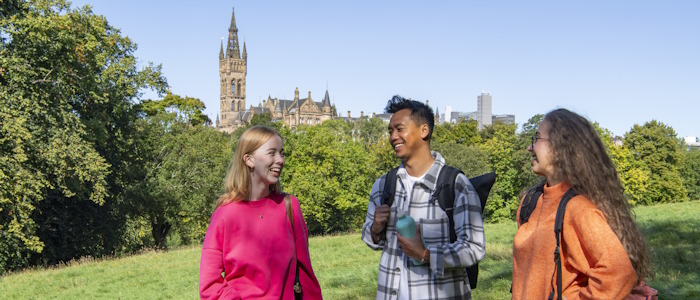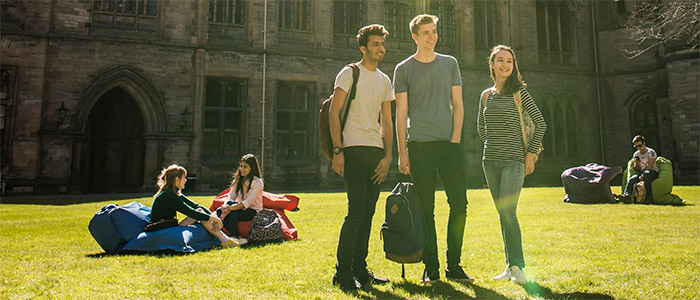Childhood Practice BA
This programme has been developed to enable students with experience of working in childhood practice to meet the requirements of the Standard for Childhood Practice (SSSC, 2015). The programme has been designed to enable practitioners to gain an academic and professional qualification while remaining in employment.
This degree has been designed to meet the registration requirements of the Scottish Social Services Council for managers/lead practitioners in day care services for children.
- August start
- Session dates
- Childhood Practice BA
- Glasgow: Gilmorehill campus
- Part-time mode of study
- Twilight learning delivery
Programme structure
The programme contains work-based elements and will be rooted in practice. You will review your experience and use this review as the basis for planning and setting targets for professional development within the programme.
Teaching is delivered through a mixture of face-to face and real time online seminars, self-study guides and online spaces which focus on active participation by students individually and collaboratively, thereby further enhancing graduate attributes and employability.
The mode of delivery is part-time twilight from 18:30 to 20:30 hours.
Year 1
In effect, students will enter into year 2 of the BA in Childhood Practice. However, accreditation of prior learning to the value of 120 level 7 credits will be required to facilitate that. Students who do not fulfil or only partly fulfil that requirement will be assigned an individualised learning statement (which will be assessed) to make up any shortfall. That will be based upon their previous experiential learning and will be assessed.
Years 2 and 3
Indicative Core Courses
- Professional Values for Leadership in Childhood Practice
- Leadership Skills for Childhood Practice
- Leading in Integrated Children's Services
- Children in Society
- Leading Practice
Additional courses that may be required to gain credit (and may involve entering into a further period of study):
- Key Issues in Childhood Practice
- Eportfolios Enhancing the Professional Dialectic
- Discourses on Childhood Practice
As this is a work-based learning programme, in addition to formal learning you will draw from your own practice in the field of childhood practice.
Programme alteration or discontinuation
The University of Glasgow endeavours to run all programmes as advertised. In exceptional
circumstances, however, the University may withdraw or alter a programme. For more information,
please see: Student contract.
Special Glasgow feature
Attainment of this degree satisfies Scottish Social Services Council registration requirements for heads of centre posts in childhood practice.
Our international links
Aspects of our courses encourage you to explore childhood practice from other countries, enabling you to make useful comparisons with and improvements in childhood practice at local, national and international scales. That can include opportunities to visit childhood practice centres in countries abroad with travel and subsistence expenses paid.
Entry requirements
for entry in 2025
Attainment of SNEB, HNC, SVQ3, SVQ4, PDA or similar professional qualification accepted by the SSSC for registration at practitioner level. You must be currently working in a childhood practice setting such as a nursery or out of school provision and be registered with the SSSC. You must also possess a minimum of two years’ work experience in childhood practice.
Admissions guidance
English language
For applicants from non-English speaking countries, as defined by the UK Government, the University sets a minimum English Language proficiency level.
English language requirements
Career prospects
This qualification will enable you to significantly develop your career in childhood practice. The graduate attributes developed will equip you as a leader in a range of childhood practice contexts and for further studies.
Engaging with this programme has enabled our students to develop their careers by following exciting pathways and to contribute more effectively to childhood practice service provision and wider Scottish society through the development of their leadership of learning and staff.
Accreditation
 This qualification leads to enhanced registration with the Scottish Social Services Council.
This qualification leads to enhanced registration with the Scottish Social Services Council.
Fees and funding
Tuition fees
How and when you pay tuition fees depends on where you’re from: see Tuition fees for details.
Scholarships
The University is committed to supporting students and rewarding academic excellence. That's why we've invested more than £1m in additional scholarship funding in recent years.
World Changers RUK Excellence Scholarship
World Changers RUK Access Bursary
James McCune Smith Undergraduate Scholarship
Care Experienced and Estranged Student Bursary
Beaconhouse Schools
Undergraduate Talent Scholarships
Cowrie Foundation Scholarship
The Clan Gregor Society Prize
The Dima Alhaj Scholarship
Sanctuary Scholarships
Travel Bursary for Forced Migrants
Glasgow Highland Society Scholarship
The scholarships above are relevant to this programme. For more funding opportunities search the scholarships database
How to apply
To apply for the BA Childhood Practice you must apply online. We cannot accept applications any other way.
Please check you meet the Entry requirements for this programme before you begin your application.
Documents
As part of your online application, you also need to submit the following supporting documents:
- Mentoring form
- Employer agreement
- Learner agreement
- Academic Transcripts for existing qualifications
- One reference letter on headed paper
You have 42 days to submit your application once you begin the process.
You may save and return to your application as many times as you wish to update information, complete sections or upload supporting documents such as your mentoring form or reference.
Guidance notes for using the online application
These notes are intended to help you complete the online application form accurately; they are also available within the help section of the online application form.
If you experience any difficulties accessing the online application, please see:
- Name and Date of birth: must appear exactly as they do on your passport. Please take time to check the spelling and lay-out.
- Contact Details: Correspondence address. All contact relevant to your application will be sent to this address including the offer letter(s). If your address changes, please contact us as soon as possible.
- Choice of course: Please select carefully the course you want to study. As your application will be sent to the admissions committee for each course you select it is important to consider at this stage why you are interested in the course and that it is reflected in your application.
- Proposed date of entry: Please select August 2024.
- Education and Qualifications: Please complete this section as fully as possible indicating any relevant Higher Education qualifications starting with the most recent. Complete the name of the Institution (s) as it appears on the certificate or transcript. Please ensure that you record all practitioner qualifications in this section (e.g. SVQ Level 3 Early Education and Childcare).
- English Language Proficiency: Please state the date of any English language test taken (or to be taken) and the award date (or expected award date if known).
- Employment and Experience: Please complete this section as fully as possible with all employments relevant to your course including your present employment. Additional details may be attached in your personal statement/proposal where appropriate.
Please note you must have a minimum of two years work experience in childhood practice and you must currently be employed in a childhood practice setting in Scotland and for the duration of the course to be eligible to gain admittance for this course. You must also be currently registered with the SSSC (Scottish Social Services Council) unless you are a childminder registered with the Care Inspectorate which in that case suffices too.
Reference: Please provide one reference. This should typically be an academic reference but in cases where this is not possible then a reference from a current employer may be accepted instead. If you already have a copy of a reference on letter headed paper then please upload this to your application. If you do not already have a reference to upload then please enter your referee’s name and contact details on the online application and we will contact your referee directly.
Application deadlines
- 30 June 2025
Subject league tables

Times & Sunday Times Good University Guide [Education]






